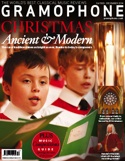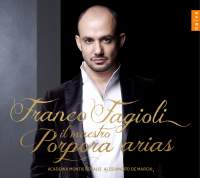Texte paru dans: / Appeared in:
*

GRAMOPHONE (12/2014)
Pour s'abonner /
Subscription information
Naïve V5369

Code-barres / Barcode : 0822186053690 (ID482)
Consultez toutes les évaluations recensées pour ce cd
~~~~ Reach all the evaluations located for this CD
Reviewer:
David
Vickers
Partnered ably by Academia Montis Regalis, Franco Fagioli sings with fulsome bravado and technical virtuosity in vibrant performances of 12 selections drawn from six different operas (for both male and female characters), a Christmas oratorio and two secular cantatas, all dating from between 1725 and 1748. Dramatic contexts, dates and cities are lacking from the skin-deep booklet, so it is unexplained which of Porpora’s two different versions of Semiramide riconosciuta (1729 Venice or 1739 Naples) has yielded a couple of arias, but I’m glad to have heard the title-heroine’s beguiling ‘Il pastor se torna aprile’, in which pastoral recorders and horns softly illustrate Metastasio’s double simile.
Fagioli regards Porpora’s arias as
a laboratory for learning, and his verbose preface dwells on the maestro’s
reputation as the singing teacher of Farinelli and many others. He calls this
music ‘So emotional, so profound’, but his sentiment, personality and projection
in the emperor Valentinian’s trumpet-festooned ‘Se tu la reggi al volo’ (Ezio),
the turbulent Araspe’s ‘Già si desta la tempesta’ (Didone abbandonata), the
valorous heroism of Selinunte’s ‘Con alma intrepida’ (Meride e Selinunte) and
the giddy Acis’s love aria ‘Nell’attendere il mio bene’ (Polifemo) are strangely
uniform. If sheer flash is all you’re after, then look no further than the
dazzling vocal cascades in ‘Spesso di nubi cinto’ from Carlo il Calvo, although
the vainglorious cadenza isn’t Fagioli’s finest hour (almost literally).
Fermer la fenêtre/Close window
Cliquez l'un ou l'autre
bouton pour découvrir bien d'autres critiques de CD
Click either button for many other reviews


